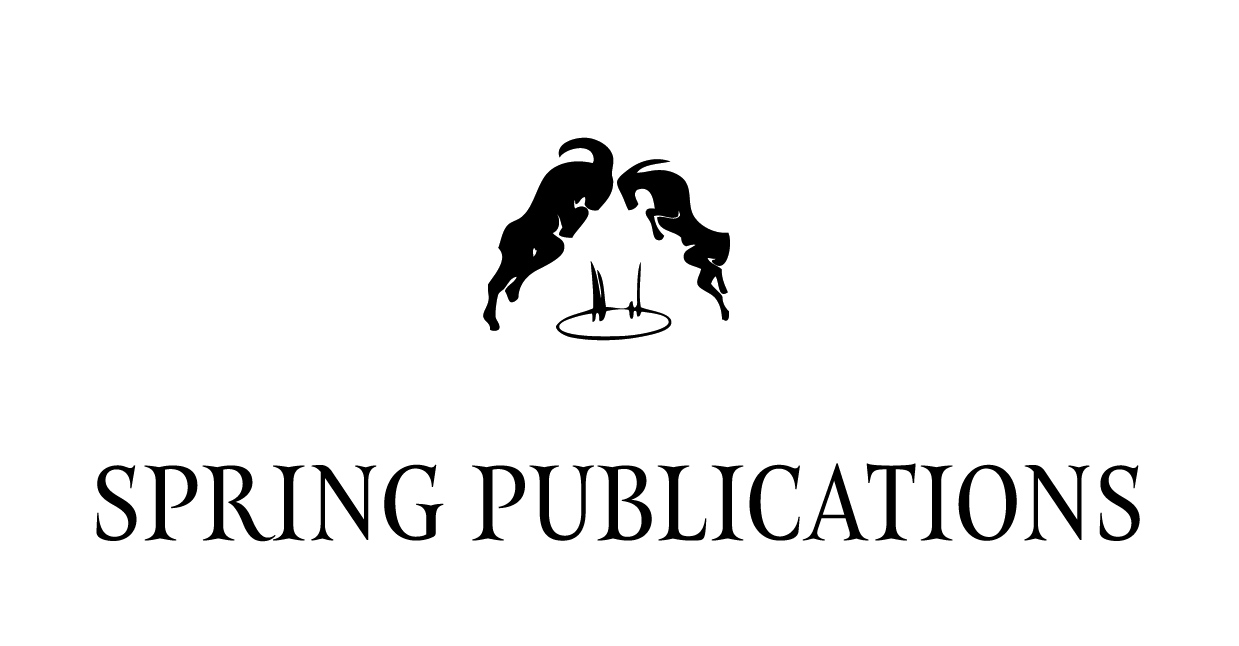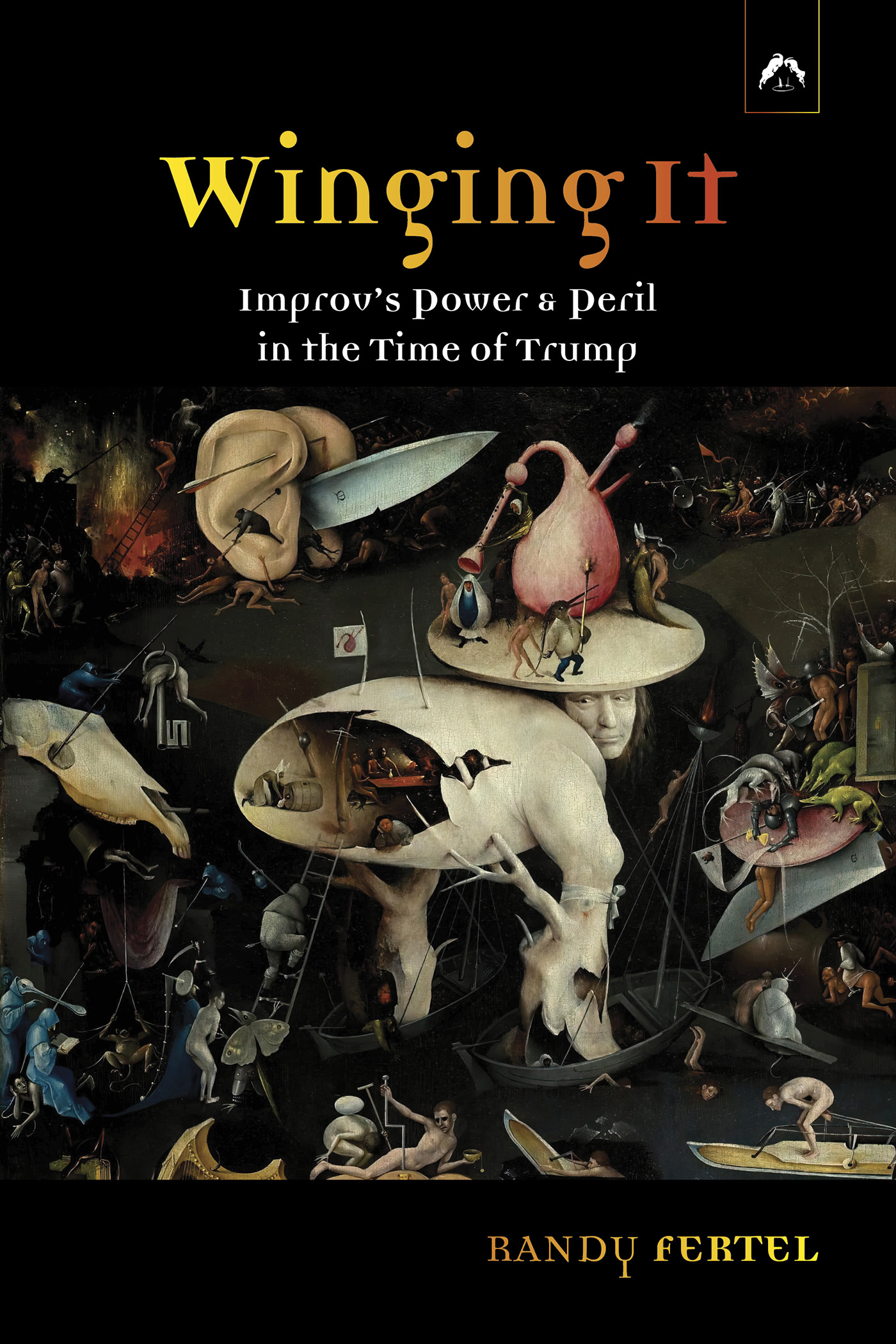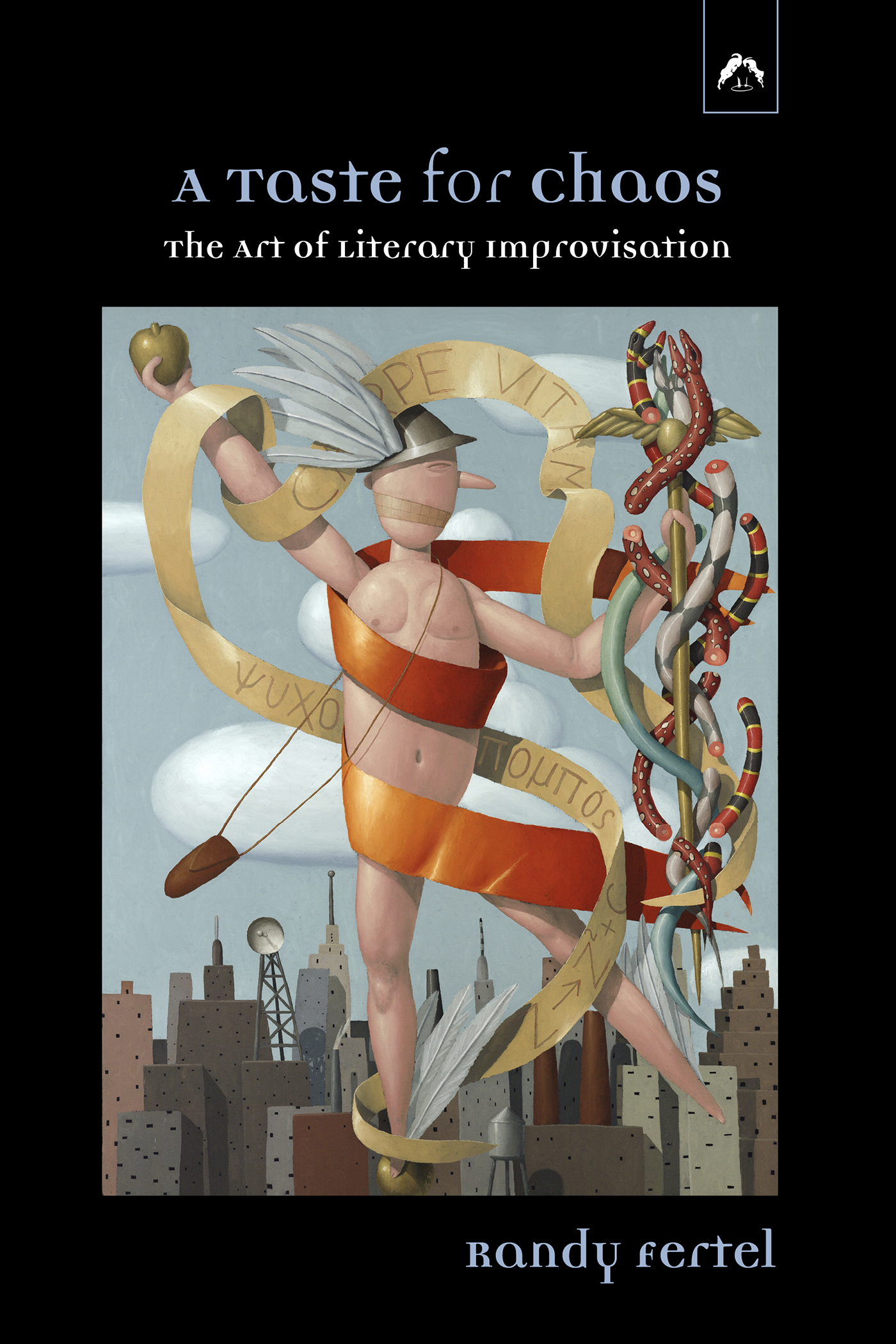RANDY FERTEL
Randy Fertel is a writer and philanthropist dedicated to the arts, education, New Orleans, and the environment. Fertel holds a Ph.D. in English and American literature from Harvard University and is the author of A Taste for Chaos: The Art of Literary Improvisation and The Gorilla Man and the Empress of Steak: A New Orleans Family Memoir. Fertel has taught English at Harvard University, Tulane University, LeMoyne College, and the New School for Social Research. He specializes in the literature of the Vietnam War and the literature of exile. In addition to his writing, Fertel is president of the Fertel Foundation and the Ruth U. Fertel Foundation, named for his mother Ruth Fertel, founder of Ruth’s Chris Steak House. He lives in New Orleans and New York.
WINGING IT
Improv’s Power and Peril in the Time of Trump
First editionPaperback original, 246 pages, color ills., $29.95
ISBN: 978-0-88214-158-9 E-book, $9.99
978-0-88214-149-7
❝
Randy Fertel is a master at unveiling theatrical illusion. In this brilliant book, he shines a piercing light into the shadows of the so-called improv style in politics. Winging It reveals the concealed instincts and the fierce emotional currents that keep a rapacious predator aloft.
— Murray Stein, author of Jung’s Map of the Soul
At the farmers market, I’m responding to color, and smell, and I’m following my intuition. In my kitchen when I’m imagining how things will lead from here, I’m improvising. In his artful and authoritative new book Winging It, Randy Fertel explores how improvisation shapes and enlivens our wider world. Yield to your impulses, act spontaneously, and get this book—it’s a revelation.
— Alice Waters, Founder of Chez Panisse and the Edible Schoolyard
In Winging It, Randy Fertel presents a wide ranging and masterful study of the art of improvisation that will delight scholars and lay readers alike. The work’s true fascination lies in its adept analysis of the political implications of the quicksilver art form. It is a work to be savored slowly and thoughtfully, especially in anticipation of the upcoming elections.
—Jessica B. Harris, author of High on the Hog: How African American Cuisine Transformed America
Winging It dances with the reader atop a mountain of scholarship, original thinking, and profound applicability. Written in the spirit and style of improvisation, this book charms the reader into a fresh perspective on our discombobulated world, touching on social media, popular culture, literary classics, neuroscience, AI, and politics. It’s smart, fun, insightful, and relevant to life today and the incomprehensibles we live within. Don’t walk, improvise your way to the bookstore to grab this irresistible tour de force from Randy Fertel.
— Eric Booth, author of Making Change and The Everyday Work of Art
In the new century, we’re all winging it now. Randy Fertel gives us an impressive and artful view of cultural patterns that are roiling our world in so many ways. His knowledge is encyclopedic and his feeling for the complexities and double binds we face is deep and humane.
— Stephen Nachmanovitch, author of Free Play and The Art of Is
Winging It is a remarkable feat of scholarship, analysis and imagination, an eclectic blend of insights from many realms of thought and study that equips the reader to make sense of such disparate phenomena as “artificial” (and pseudo-) intelligence, Benoît Mandelbrot’s fractal geometry, Oscar Wilde’s “meticulously prepared art” of spontaneity, and the perverse fascination of Donald “the Dark Trickster” Trump. Fertel’s healing faith in intuition rings from every page.
— Tom Mueller, author of How to Make a Killing: Blood, Death and Dollars in American Medicine
A masterwork—voracious in scope …and about as hopeful as can be in these troubling times.
— Bruce Boyd Raeburn, Curator Emeritus, Hogan Archive of New Orleans Music and New Orleans Jazz, Tulane University
In Winging It, Randy Fertel returns to his life-long fascination with improvisation, following its threads from antiquity to the magic and madness of our unsettling present. Fertel will scare you and free you, as he peers deeply into the light and the dark spaces where improvisation ennobles or vexes our lives and culture. Radio is my home and I love the starring role he ascribes to listening, both in the construction of this rollicking and seductive book and within improv itself.
— Davia Nelson, The Kitchen Sisters, Radio/Podcast Producer
— Murray Stein, author of Jung’s Map of the Soul
At the farmers market, I’m responding to color, and smell, and I’m following my intuition. In my kitchen when I’m imagining how things will lead from here, I’m improvising. In his artful and authoritative new book Winging It, Randy Fertel explores how improvisation shapes and enlivens our wider world. Yield to your impulses, act spontaneously, and get this book—it’s a revelation.
— Alice Waters, Founder of Chez Panisse and the Edible Schoolyard
In Winging It, Randy Fertel presents a wide ranging and masterful study of the art of improvisation that will delight scholars and lay readers alike. The work’s true fascination lies in its adept analysis of the political implications of the quicksilver art form. It is a work to be savored slowly and thoughtfully, especially in anticipation of the upcoming elections.
—Jessica B. Harris, author of High on the Hog: How African American Cuisine Transformed America
Winging It dances with the reader atop a mountain of scholarship, original thinking, and profound applicability. Written in the spirit and style of improvisation, this book charms the reader into a fresh perspective on our discombobulated world, touching on social media, popular culture, literary classics, neuroscience, AI, and politics. It’s smart, fun, insightful, and relevant to life today and the incomprehensibles we live within. Don’t walk, improvise your way to the bookstore to grab this irresistible tour de force from Randy Fertel.
— Eric Booth, author of Making Change and The Everyday Work of Art
In the new century, we’re all winging it now. Randy Fertel gives us an impressive and artful view of cultural patterns that are roiling our world in so many ways. His knowledge is encyclopedic and his feeling for the complexities and double binds we face is deep and humane.
— Stephen Nachmanovitch, author of Free Play and The Art of Is
Winging It is a remarkable feat of scholarship, analysis and imagination, an eclectic blend of insights from many realms of thought and study that equips the reader to make sense of such disparate phenomena as “artificial” (and pseudo-) intelligence, Benoît Mandelbrot’s fractal geometry, Oscar Wilde’s “meticulously prepared art” of spontaneity, and the perverse fascination of Donald “the Dark Trickster” Trump. Fertel’s healing faith in intuition rings from every page.
— Tom Mueller, author of How to Make a Killing: Blood, Death and Dollars in American Medicine
A masterwork—voracious in scope …and about as hopeful as can be in these troubling times.
— Bruce Boyd Raeburn, Curator Emeritus, Hogan Archive of New Orleans Music and New Orleans Jazz, Tulane University
In Winging It, Randy Fertel returns to his life-long fascination with improvisation, following its threads from antiquity to the magic and madness of our unsettling present. Fertel will scare you and free you, as he peers deeply into the light and the dark spaces where improvisation ennobles or vexes our lives and culture. Radio is my home and I love the starring role he ascribes to listening, both in the construction of this rollicking and seductive book and within improv itself.
— Davia Nelson, The Kitchen Sisters, Radio/Podcast Producer
A TASTE FOR CHAOS
The Art of Literary Improvisation
Second, revised editionPaperback original, 500 pages, $28
ISBN: 978-0-88214-987-5 E-book, $9.99
ISBN: 978-0-88214-993-6
❝
A Taste for Chaos is a stunner of a book—smart, jarring, innovative, witty, provocative, wise, and beautifully written. As a sustained and unified work of literary analysis, this book is nothing short of dazzling, both in its meticulously structured central argument and in its intricate exploration of the artistic tensions between order and disorder, reason and intuition, design and improvisation. Not only is this a book about the artistic endeavor, but it is also a work of art in its own right.
—Tim O’Brien, author of The Things They Carried Randy Fertel leads us on a brilliant literary exploration of improvisation and the art of appearing spontaneous. From Louis Armstrong to Derrida, Twain to Jung to Joyce, he shows how order emerges from chaos. It’s a delightful and fascinating book, written with a jazz-like enthusiasm.
—Walter Isaacson, CEO, Aspen Institute; author of The Innovators, Steve Jobs, and Leonardo da Vinci An inquisitive examination of the impulse that yields literary improvisation—which is to say, literature itself … A smart blend of psychology, philosophy and literary history … A tour de force of reading in the fields of literary theory and history befitting a George Steiner or Erich Auerbach.
—Kirkus Review In A Taste for Chaos Randy Fertel takes us deep into the substrata of the literary imagination and the creative process, linking such seemingly disparate minds as James Joyce’s and Louis Armstrong’s. It’s a fascinating exposition of the mysteries and benefits of improvisation.
—Bruce Boyd Raeburn, Curator of the Hogan Jazz Archive, Tulane University; author of New Orleans Style and the Writing of American Jazz History
—Tim O’Brien, author of The Things They Carried Randy Fertel leads us on a brilliant literary exploration of improvisation and the art of appearing spontaneous. From Louis Armstrong to Derrida, Twain to Jung to Joyce, he shows how order emerges from chaos. It’s a delightful and fascinating book, written with a jazz-like enthusiasm.
—Walter Isaacson, CEO, Aspen Institute; author of The Innovators, Steve Jobs, and Leonardo da Vinci An inquisitive examination of the impulse that yields literary improvisation—which is to say, literature itself … A smart blend of psychology, philosophy and literary history … A tour de force of reading in the fields of literary theory and history befitting a George Steiner or Erich Auerbach.
—Kirkus Review In A Taste for Chaos Randy Fertel takes us deep into the substrata of the literary imagination and the creative process, linking such seemingly disparate minds as James Joyce’s and Louis Armstrong’s. It’s a fascinating exposition of the mysteries and benefits of improvisation.
—Bruce Boyd Raeburn, Curator of the Hogan Jazz Archive, Tulane University; author of New Orleans Style and the Writing of American Jazz History


